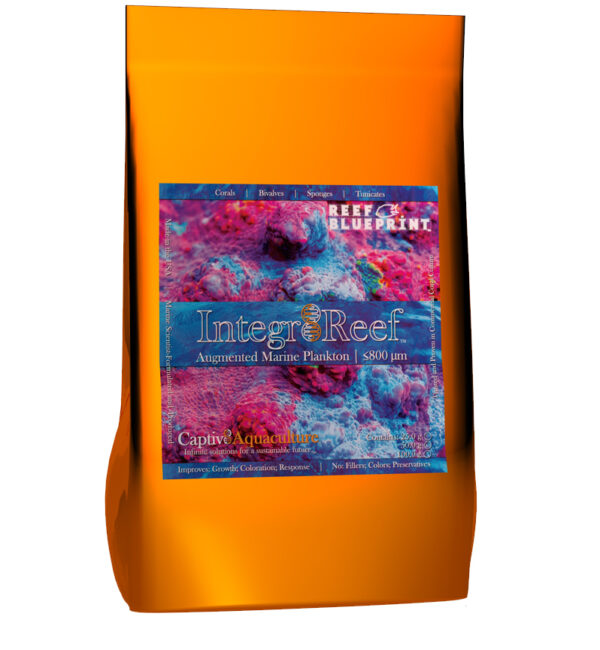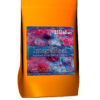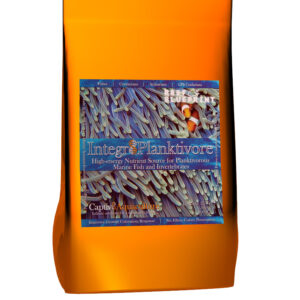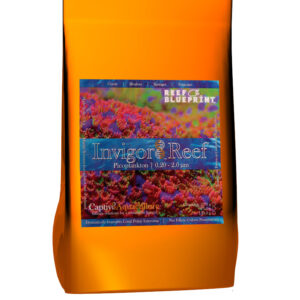<800 micron dry blend for corals, bivalves, and tunicates which yields noticeably improved cohort robustness, feeding response, rate of tissue synthesis, and richness of color when applied on a consistent basis. Composed of: marine zooplankton (Arthropoda) and phytoplankton featuring rich fatty acid, amino acid, and biopigment profiles; specific immunostimulants; protein biosynthesis stimulants; and biological pigment precursors. Low PO4 per unit mass enables greater feeding frequency. Free of fillers, preservatives, and food colors.
Augmented Plankton | ≤800 μm | Specifically formulated for aquaculture of Cnidarians, Bivavles, Tunicates, and Sponges
Specifications
- Cr. Protein (min): 30.3%
- Cr. Fat (min): 22.6%
- Cr. Fiber (max): 16.9%
- Moisture (max): 6.2%
- Ash: 5.5%
This formulation provides twenty-one essential amino acids; thirteen major, minor, and trace elements, including selenium (1.9 mg/kg); Omega-3 and -6 HUFAs (19.6 mg/g and 0.2 mg/g, respectively); fourteen vitamins; and beta carotene (302 mg/kg).
Application
This formulation has undergone extensive application in commercial marine aquaculture and university facilities raising cnidarians, tunicates, marine bivalves, and sponges.
Observers have noted superior feeding response and overall improvement in polyp extension (where applicable), as well as noticeably intensified coloration and improved tissue growth rate when applying this formulation (to the exclusion of all others) on a routine basis to satisfy cohort feeding requirements.
Additionally, the low phosphate content per unit mass of this formulation enables greater feeding frequency with lower nutrient impact than is possible when using non-Captiv8 Aquaculture feeds. Furthermore, Integr8 Reef (and all other Integr8 formulations) is preservative-free, and does not incorporate: preservatives; pH-modifying components; food colors (artificial or otherwise); animal byproducts; brewer’s yeast or the like; grains and/or other terrestrial crop components; Artemia cysts; or oils.
Integr8 Reef is a dry blend, which consists of: marine zooplankton (Arthropoda) and phytoplankton featuring rich fatty acid, amino acid, and biopigment profiles; specific immunostimulants; protein biosynthesis stimulants; and biological pigment precursors. These components operate in synergy to yield improved cohort robustness, feeding response, rate of tissue synthesis, and richness of color when applied on a consistent basis.
Keep out of reach of children and unauthorized persons. Arthropod component may be considered an allergen to some users (specifically, those with shellfish allergy); therefore, avoid contact with skin, eyes, and mucous membranes. Store in a cool, dry location away from sunlight.
Unmixed product does not require refrigeration. Store tightly-sealed, in cool, dry location. Do not permit contamination of container with moisture or foreign material. Do not dispense unmixed product into system; follow preparation steps, below.
Preparation
Integr8 Reef must be adequately saturated with water prior to application; failure to saturate components will result in loss to surface skimming devices. Depending upon method of application, system water or purified water may be utilized in saturation process; review entire information below.
In a clean mixing vessel, mix in a ratio of ~5:1 water (mL) to Integr8 Reef (g) (ex. mix 100 mL water with 20 g Integr8 Reef). If a thinner fluid consistency is desired, then use more water.
Cap and shake vessel to thoroughly saturate Integr8 Reef components, and allow to sit for 1 – 2 minutes prior to use. Prior to each use, shake vessel to re-suspend components.
Determining mass of Integr8 Reef required: If applying this formula in systems raising cohorts of suspension-feeding sessile invertebrates (e.g. cnidarians, poriferans, sedentarians, bivalvians, ascidians, etc.), then apply 0.20 g of Integr8 Reef per square foot of colonized area per day. Modify application frequency and mass of Integr8 Reef applied per cohort requirements.
Recommended: Determine mass of Integr8 Reef required during a period of no more than 12 hours, then add this amount to a clean mixing vessel with adequate water from the system to form a suspension with the desired fluid consistency. Allow vessel to remain at room temperature. If using system water, then entire contents of vessel should be used within 12 hours of initial mixing. This approach is recommended because the temperature of the suspension will closely match the system temperature, as opposed to using a suspension which is considerably colder due to refrigeration. Target individual cohort members, or apply suspension in close proximity to circulation pump discharge, as appropriate.
Metered Application: If mixing a larger amount of Integr8 Reef suspension than will be required for 12 hours, then substitute purified water for system water in the preceding instructions, and store Integr8 Reef suspension at T≤40°F outside of periods of use. Pour required volume of mixture into syringe or separate dosing vessel. Do not contaminate mixture with system water. The use of a magnetic stirring platform to maintain homogeneity of the suspension is recommended if application will be performed with a dosing pump. Locate point of entry in close proximity to circulation pump discharge. If applying manually, then shake vessel prior to application to ensure homogeneity of suspension. Target individual cohort members, or apply suspension in close proximity to circulation pump discharge, as appropriate.
Feeding response
The feeding response elicited by Integr8 Reef (and, for that matter, all Integr8 formulations) is due to the combination of components, which is entirely appropriate for cohorts composed wholly or in part of suspension-feeding marine invertebrates and finfish, and which (importantly) incorporates specific compounds recognized by the chemoreceptor system of these organisms; this response is observed within cohorts including sessile and motile invertebrates, as well as finfish, all groups reacting positively to the introduction of Integr8 formulations to their environment. The videos below provide some indication of the reactions that are commonly observed among complex cohorts composed of invertebrates (sessile and motile) and finfish species (included either as part of a polyculture or as an algae/pest control measure). Regarding Cnidarians, specifically, polyp extension associated with the upstream introduction of Integr8 generally occurs within 60 seconds, though it is not uncommon for the reaction to occur within 5 seconds, particularly in systems within which Integr8 is regularly applied. The feeding response has been observed to last for several hours in some systems.
It is important to state that the feeding response elicited by Integr8 formulations is not a matter of a reaction to sudden exposure to “unusual” pH or temperature, which is involved when target feeding a preserved or refrigerated suspension, respectively; this distinction is made because a tactical response to target feeding, such as extended polyps suddenly recoiling when a cold and/or acidic suspension of food is directly applied, gives some observers the impression that the food is being ingested due to suitability and positive feeding response of the target organism or colony. A squirt of cold or strongly acidic or basic water will have similar results, and does not reliably indicate acceptance or recognition of the substance as a food.




